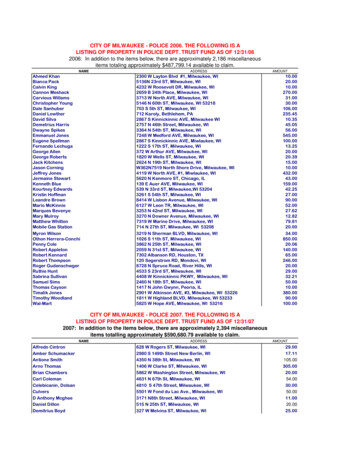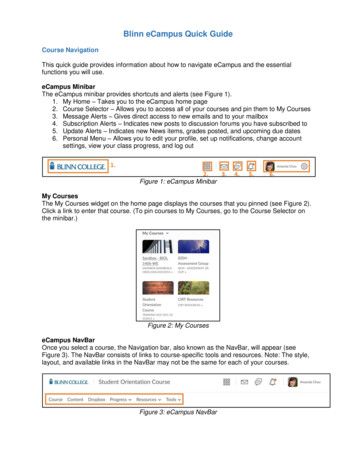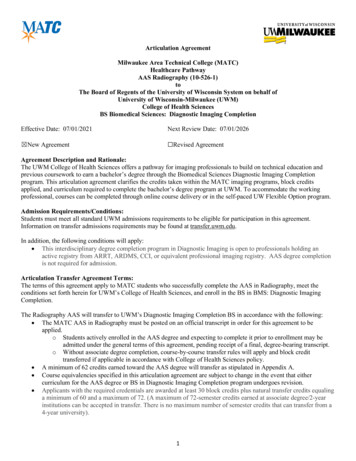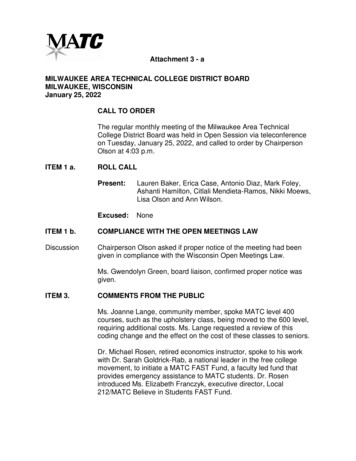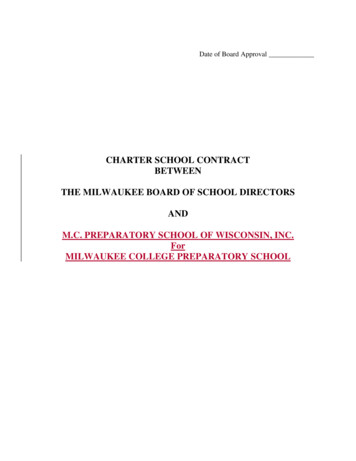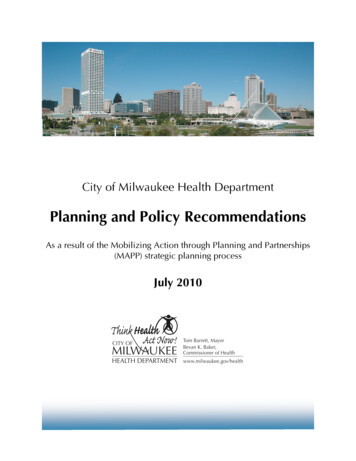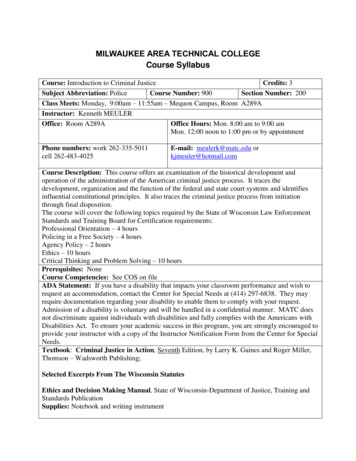
Transcription
MILWAUKEE AREA TECHNICAL COLLEGECourse SyllabusCourse: Introduction to Criminal JusticeCredits: 3Subject Abbreviation: PoliceCourse Number: 900Section Number: 200Class Meets: Monday, 9:00am – 11:55am – Mequon Campus, Room A289AInstructor: Kenneth MEULEROffice: Room A289AOffice Hours: Mon. 8:00 am to 9:00 amMon. 12:00 noon to 1:00 pm or by appointmentPhone numbers: work 262-335-5011cell 262-483-4025E-mail: meulerk@matc.edu orkjmeuler@hotmail.comCourse Description: This course offers an examination of the historical development andoperation of the administration of the American criminal justice process. It traces thedevelopment, organization and the function of the federal and state court systems and identifiesinfluential constitutional principles. It also traces the criminal justice process from initiationthrough final disposition.The course will cover the following topics required by the State of Wisconsin Law EnforcementStandards and Training Board for Certification requirements:Professional Orientation – 4 hoursPolicing in a Free Society – 4 hoursAgency Policy – 2 hoursEthics – 10 hoursCritical Thinking and Problem Solving – 10 hoursPrerequisites: NoneCourse Competencies: See COS on fileADA Statement: If you have a disability that impacts your classroom performance and wish torequest an accommodation, contact the Center for Special Needs at (414) 297-6838. They mayrequire documentation regarding your disability to enable them to comply with your request.Admission of a disability is voluntary and will be handled in a confidential manner. MATC doesnot discriminate against individuals with disabilities and fully complies with the Americans withDisabilities Act. To ensure your academic success in this program, you are strongly encouraged toprovide your instructor with a copy of the Instructor Notification Form from the Center for SpecialNeeds.Textbook: Criminal Justice in Action, Seventh Edition, by Larry K. Gaines and Roger Miller,Thomson – Wadsworth Publishing;Selected Excerpts From The Wisconsin StatutesEthics and Decision Making Manual, State of Wisconsin-Department of Justice, Training andStandards PublicationSupplies: Notebook and writing instrument
Course Calendar:January 27Chapter 1 and “Policing in a Free Society”February 3Chapters 1 and 2February 10Chapters 3February 17Chapter 4February 24TEST – Chapters 1 through 4 & Policing in a Free SocietyDiscussion Hiring ProcessMarch 3Assignment: Requirements and Hiring Procedure for LE AgencyChapter 5 pages 144 through 162 and “Professional Orientation”March 10Chapter 6 pages 171 through 193 and “Agency Policy”Discussion - Role of Discretion & Agency PolicyMarch 17Assignment: Critical Thinking and Problem Solving ScenariosChapter 6 pages 193 through 206 and “Ethics and Decision Making” –Training Guide for Law Enforcement OfficersMarch 24Movie Serpico / Discussion on EthicsMarch 31Assignment: Ethics and Decision Making Scenarios“Ethics and Decision Making” – Training Guide for Law Enforcement OfficersApril 7Continue Scenarios on Ethics and Decision MakingTEST – Chapters 5 and 6, Ethics and Decision MakingApril 14Spring BreakApril 21Chapters 8 and 9April 28Chapters 9 and 10May 5Chapters 11 and 12May 12Chapters 13 and 14 – Movie on PrisonsMay 19TEST – Chapters 8 through 14
Course Requirements and Grading:Each student is responsible for all class lectures and discussions, and all assignments. Thesuccessful student in this class will be an active participant. Students are encouraged to share theirexperiences that relate to the material, to further research topics and stay current of today’s newsthat relates to policing. In order to be an active participant, students must prepare for and attendclass. This class is not only your learning experience, but that of everyone else in the class. Policeprofessionals learn from each other. The same is true in the classroom.Grading:5 % - Assignment on Hiring Procedure25 % – Test One10 % - In Class Assignment – Scenarios on Problem Solving10 % - In Class Assignment – Scenarios on Ethics25 % – Test Two25 % – Test ThreeAttendance Policy:All MATC attendance policies apply. You are responsible for attending all classes and completingall course assignments. Students missing any part of a class will be charged with at least ½ of aclass missed. Students missing more than three class periods will be dropped by theinstructor. Reinstatement to the class requires permission from the Dean of Protective Services.The attendance policy is listed in the student handbook and school catalog.If due to illness or other emergency you cannot attend class on a test date or date of an inclass graded assignment you must notify me prior to the start of class. If you fail to notify meand you do not take a test at the assigned time you will be given a “0” for the test. NOEXCEPTION!College Certification Track Students:Students taking or planning to take this course as part of the State of Wisconsin, Departmentof Justice, Law Enforcement Standards Board (LESB), Training and Standards Bureau –Basic Police Recruit School – cannot miss more than 10% of the classes (1 and ½ classperiods). In addition if you miss class on the day we are doing mandatory exercises, you willnot be able to successfully complete the requirements of the State of Wisconsin LawEnforcement Standards and Training Board. Any student who does not comply with thisLESB standard will not be eligible for certification as a police officer in the State ofWisconsin.
College Certification Track Students:You have three calendar years to complete all of the technical classes, complete all Unified Tactics(Police 170, 171, 172, 173, 174, 175, & 176) with a grade of “C” or better and successfully passScenario Based Assessments.The clock starts for college certification track students on the first day a college certification trackstudent enters into a core criminal justice course.The MATC Criminal Justice/Law Enforcement web site can be found at:http://ecampus.matc.edu/policetrainingThe “District Emergency Procedure Guide” is also available on this web site. Each student isstrongly encouraged to review the guide.School Closing Information: WMVS, Channel 10, is the official medium for announcingcancellation of classes and closing of operations at any MATC campus or evening center in theevent of severe weather or other emergency as determined by the administration. You may alsocall the emergency school closing number at 414-297-6561 to check the status of canceled classes.DO NOT call the instructor regarding school closing information.
Classroom Conduct:Students shall turn off all cell phones during class. If you need to take a call you should put yourphone on vibrate and take the call outside the classroom. Students shall not text or use otherelectronic social media in the classroom. Use of a cell phone or other electronic device during atest is strictly prohibited. If a student is observed using a cell phone or other electronic deviceduring a test the student shall receive a "0" on that test.Students are not authorized to use any electronic recording devices in the classroom without thepermission of the instructor.Students are only allowed to use a lap top or computer in class for class related research and notetaking.Students are not allowed to read material, including newspapers and magazines, during class thatis not related to class discussions.Students are not to have private conversations during class.Students are not permitted to sleep during class.Students shall show courtesy and respect towards the instructors and fellow classmates in theclassroom, on MATC property, and at all MATC functions.All other policies stated in the Student Handbook apply.College Certification Track students who violate class rules will be required to submit an “In theMatter Of” report to be placed in your permanent file.Student Complaint Procedure:1. A face to face meeting with the instructor. 2. A written complaint to the instructor detailing thecomplaint and a proposed resolution. 3. If a resolution cannot be worked out, the student may thenwrite his or her complaint to the Associate Dean of Protective Services. (Refer to the StudentHandbook and School Catalog)Student Signature:See Memo of Understanding/Syllabus Receipt
MATC Core AbilitiesCommunicate effectively. Learner speaks effectively for the intended purpose, audience, occasion, and topic. Learner writes effectively for the intended purpose, audience, occasion, and topic. Learner applies rules of Standard English language structure, including grammar and spelling. Learner uses correctly the language of his/her discipline. Learner chooses presentation format (oral, written, graphic) appropriately. Learner communicates in a bias-free manner. Learner supports viewpoints with evidence.Collaborate with others. Learner cooperates with others. Learner resolves conflicts effectively. Learner participates in shared problem-solving. Learner demonstrates empathy, respect and concern for others.Respect diversity. Learner acknowledges personal prejudices, and biases. Learner appreciates perspectives of people outside his/her own background/culture. Learner works collaboratively with people from other backgrounds/cultures. Learner demonstrates awareness of global issues.Demonstrate responsibility. Learner prepares for and attends class. Learner turns in quality work. Learner adheres to safety rules and regulations. Learner acts professionally to fulfill job duties within chosen field. Learner demonstrates flexibility and self-directedness in learning. Learner acknowledges a responsibility to the global community - cultural, economic,environmental, and political. Learner practices environmental sensitivity in his/her profession. Learner utilizes effective time management.Think critically and creatively. Learner differentiates between assertions based on evidence and opinions. Learner considers others’ viewpoints and perspectives. Learner presents logical and reasonable arguments. Learner evaluates sources of information for credibility and reliability. Learner analyzes relationships between ideas, people, events, and things. Learner breaks complex problems into component parts. Learner selects and applies problem solving methods. Learner evaluates implications of alternative solutions. Learner anticipates future trends. Learner considers unconventional solutions.
Utilize technology. Learner acknowledges the scope of technology. Learner recognizes the cultural, social, economic, and political effects of technology. Learner solves problems using technology. Learner uses the technologies appropriate for their occupational program. Learner recognizes the impact of technology. Learner uses appropriate technology to obtain information. Learner uses appropriate technology to manage information.Apply math and science. Learner analyzes data appropriately. Learner interprets meaning from scientific data.Demonstrate environmental responsibility. Learner models sustainable practices. Learner identifies environmental issues. Learner practices resource conservation. Learner practices environmental sensitivity.Embrace change. Learner thinks positively of improved outcomes. Learner realistically assesses workplace environment. Learner anticipates challenges and adjustments. Learner increases flexibility. Learner reflects upon successful outcomes. Learner adjusts to changing circumstances. Learner celebrates successful change.
MILWAUKEE AREA TECHNICAL COLLEGE Course Syllabus Course: Introduction to Criminal Justice Credits: 3 Subject Abbreviation: Police Course Number: 900 Section Number: 200 Class Meets: Monday, 9:00am - 11:55am - Mequon Campus, Room A289A Instructor: Kenneth MEULER Office: Room A289A Office Hours: Mon. 8:00 am to 9:00 am Mon. 12:00 noon to 1:00 pm or by appointment
